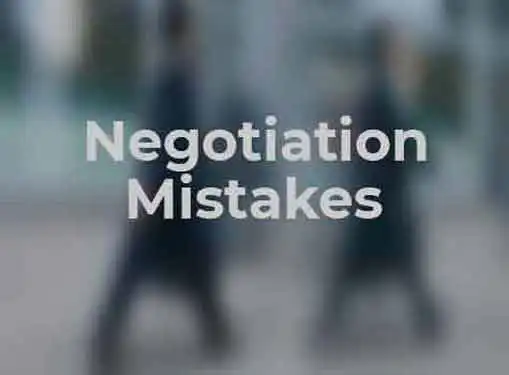Negotiations
Common Negotiation Mistakes
Good negotiators make a habit of studying other people's mistakes to improve their own negotiating skills. Here are some of the common negotiation mistakes you need to know about.
Every negotiation is a learning opportunity.

When the negotiation goes well, you can learn a lot about your negotiating style and the strategies that helped you achieve a successful deal. You may even walk away with ideas about how you can adjust your strategy to be even more successful in future negotiations. But what happens when the negotiation doesn't go so well?
The sad reality is that many negotiations don't end successfully - at least not for the party that came out on the losing end of the deal. But unsuccessful negotiations have just as much learning value as successful ones, especially when you can benefit from someone else's negotiation failures. The majority of bombed negotiations boil down to a handful of common negotiation mistakes that you'll want to avoid when cutting deals for your company.
- Overestimating your position. We're always surprised by the number of people who enter negotiations with an inflated view of their strengths, position, and skills. Although sometimes overconfidence is a bluffing technique, it's often an inaccurate self-assessment that inevitably tanks the process.
- Underestimating the other party's position. An underestimation of your opponent's strength can be just as fatal as an overestimation of your own strengths. A good preparation strategy requires you to know yourself as well as your opponent. Never begin negotiations blindly; accurately assess your opponent's strengths and develop a strategy for exploiting his weaknesses.
- Feeling intimidated. Intimidation is a powerful negotiation strategy. Large organizations and experienced negotiators get their way by intimidating their opponents into believing that they stand no chance of gaining the upper hand. Ignore your opponent's grandstanding and refocus the process on objective facts and bargaining criteria.
- Misjudging shared knowledge. Negotiation isn't an exact science. Sometimes you'll have to base decisions on a best estimate of your opponent's knowledge. A certain amount of guesswork is unavoidable. But as the stakes go up, so does the need to be confident that your opponent does (or doesn't know) what you think he knows.
- Total inflexibility. Negotiation is designed to be a give-and-take process. Inexperienced negotiators have a tendency to enter negotiations with a single outcome in mind and are unwilling to entertain any other options. Total inflexibility may look good on paper, but in practice it's the fast track to a failed negotiation.
- Not walking away. Eventually it may be necessary to walk away from the negotiation process. But the only way that can happen is if you have identified alternatives before you started negotiating. Entering negotiations without alternatives forces you to make a deal at any cost - and that's a huge mistake.
Share this article
Additional Resources for Entrepreneurs



Conversation Board
We greatly appreciate any advice you can provide on this topic. Please contribute your insights on this topic so others can benefit.